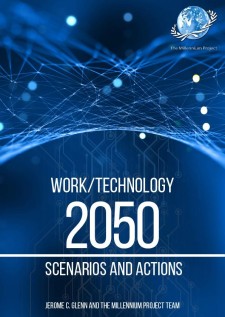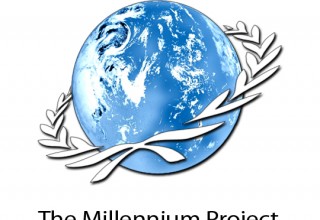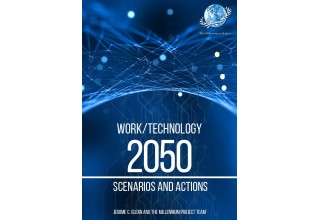STEM Education is Not Enough to Address the Future of Work, Says Global Think Tank

WASHINGTON, August 26, 2019 (Newswire.com) - The Millennium Project, a global participatory think tank with 65 Nodes around the world, will release Work/Technology 2050: Scenarios and Actions, on Sept. 2, 2019.
A pragmatic exploration of possible futures - choices and consequences - really exercised my imagination.
--- Vint Cerf, Internet Pioneer
Pre-publication copies are available to the press and reviewers upon request to Jerome.Glenn@Millennium-Project.org. This international long‑range study includes three detailed scenarios to 2050 and assessments of 93 actions. The actions are the results of 30 national workshops in 20 countries. The purpose of these workshops was to identify strategies to address the issues raised in the scenarios. These actions were assessed by five international surveys as to their feasibility to avoid the looming disasters forecast by others and how to change the world for the better.
Income gaps are widening, the concentration of wealth is increasing, jobless economic growth seems the new norm, and return on investment in capital and technology is usually better than labor. As labor costs go up and AI and robot costs go down, manufacturing and service unemployment rates are expected to increase. So, what to do?
The Millennium Project reviewed over thirty “future of work” studies to find what questions were not asked and those that were answered inadequately. This formed the basis for a questionnaire (referred to as a Real-Time Delphi or RTD) to answer these questions. The results were used to create three draft scenarios to 2050 (alternative stories that connect the world in 2050 to the present with cause and effect links that illustrate decisions). Each scenario received a critical review by international panels of futurists and relevant experts selected by The Millennium Project’s Nodes around the world (these Nodes are groups of institutions and people that connect global and local perspectives and research). Each scenario is about ten pages full of rich details about plausible developments from today to 2050.
Three scenarios are:
· It’s Complicated—A Mixed Bag
· Political/Economic Turmoil—Future Despair
· If Humans Were Free—The Self-Actualization Economy
The final scenarios were discussed by participants in national workshops to identify what their countries should do to address the issues exposed in the scenarios. The workshops had discussion groups for government, business and labor, education and learning, arts and culture, and science and technology communities. The hundreds of suggestions collected through some 30 workshops were distilled into 93 actions. These were then submitted for assessment as to their feasibility and effectiveness via RTD questionnaires to international global panels of experts.
Work/Technology 2050: Scenarios and Actions final report includes the full text of the three scenarios and a page of views on each of the 93 actions. “For those serious about addressing the future of work and technology, this report is a gold mine," says Jerome Glenn, CEO of The Millennium Project. “We think this is the broadest, deepest, most international long-range assessment of strategies to address the future transition of work and technology. Granted, there is no way everyone will agree with all 93 actions, but the more of these are implements, the smoother our transition will be to the next age.”
Among the 93 actions distilled from the workshops were:
- Establish technology forecasting and assessment agencies to inform legislative, judicial, and executive functions of government about future technology and their impacts (a government Agency for the Future).
- The government, business, and the labor unions should cooperate to create lifelong learning models including forecasts of future skills requirements and training programs.
- In parallel to STEM education create a hybrid system of self-paced inquiry-based learning for self-actualization, creativity, critical thinking, and human relations using new AI tools.
- Create international standards for narrow and general AI with a governance system to enforce them (maybe similar to the International Atomic Energy Agency – IAEA).
- Produce alternative cash flow projections for universal basic income to see if/when it is financially sustainable.
- Put memes in advertisements to help the cultural transition to new forms of economics and work.
- Create personal AI/Avatars able to match peoples' skills and interests with income opportunities worldwide which can make smart contracts to support self-employment.
- Shift education/learning systems more toward mastering skills than mastering a profession.
- Public/private research should explore the cultural transition for a new social contract between the government and the citizens who potentially could be both unemployed and augmented geniuses.
- Art/media/entertainment leaders should engage the public in anticipating cultural changes due to potential impacts of future technologies.
Some reviews:
Fresh, in-depth take on the future of work; the insights offered in the three future scenarios are both chilling and exciting. A deep dive into this report is well worth the journey.
---Nancy Donaldson, former Washington Office Director, ILO
Valuable input for policymaking to help identify the unknowns that should be known for a good anticipatory thinking and strategic planning.
--- Eva Kaili, Member of the European Parliament, Chair of the Panel for Future of S&T (STOA)
Important and relevant to the current global debates on effects of the digital takeover of so many sectors of national economies, which we cover closely.
--- Dr. Hazel Henderson, CEO, Ethical Markets Media
A great database of solutions and wealth of ideas for how everyone can play their part in dealing with an uncertain future.
--- Brock Hinzmann, Business Futures Network (London, Silicon Valley, Tokyo)
“We need to think globally and long-term about the future of work-technology dynamics,” says Elizabeth Florescu, Director of Research for The Millennium Project, “because if some countries do everything right to make a relatively smooth transition to the next economy, but others do not, increasing divides and mass migration are very likely.”
The report explains that since everything seems to be becoming increasingly more complex, it is reasonable to assume that the actions to address this transition will also be complex as well. It concludes by saying, “We may not need to do all 93 actions assessed by the international panels, but we do have to do more than just get STEM into more educational systems.”
The Millennium Project is an independent nonprofit global participatory futures research think tank of futurists, scholars, business planners, and policymakers who work for international organizations, governments, corporations, non-governmental organizations, and universities. It has 65 Nodes (groups of institutions and individuals) around the world that identify long-range challenges and strategies, and initiate foresight studies, workshops, symposiums, and advanced training. Over 4,500 experts have participated in The Millennium Project’s research since its founding in 1996. The Project’s mission is to improve thinking about the future and make those insights available through a variety of media for feedback to accumulate wisdom about the future for better decisions today. It produces the State of the Future reports, the Futures Research Methodology series, the Global Futures Intelligence System (GFIS), and special studies. The Millennium Project was selected among the top think tanks in the world for new ideas and paradigms by the University of Pennsylvania’s GoTo Think Tank Index, and was named Computerworld Honors Laureate for its contributions to collective intelligence systems.
Source: The Millennium Project



